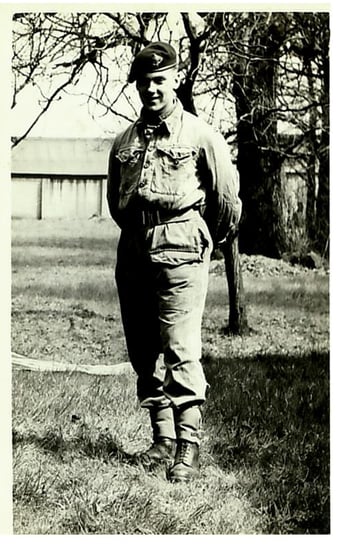Each November, we commemorate Remembrance Day, honouring the brave souls who stood in defense of our freedoms. This year, we delve into a slightly different military journey of one such hero. Englishman William “Bill” Wornes — whose childhood was indelibly marked by the war — served with both the British and Canadian armies, bringing music and courage to various corners of the world.
 A lucky escape at an early age
A lucky escape at an early age
Born in London in June 1940, amidst the chaos of World War II, Bill's story began in the cradle of conflict and his first encounter with the horror of war came before his first birthday. "When I was six months old my family home was bombed,” he said, recalling his family’s account of that day. Thankfully Bill and his family weren’t home that day and though he doesn't remember the event, the stories of that fateful night in December when an air raid damaged his family’s West London home still linger.
According to Bill’s parents, the uncertainty and fear that gripped civilians during those years was palpable. "With one bomb type, you knew that they were coming because they had that jet-propelled tail," he recalled describing the V-1 rockets that terrorized London. “But there were other bombs, V-2s, that you didn’t know were coming. Those were the scariest.” His father’s wise decision to temporarily relocate near Nottingham, seeking respite from the bombings, highlighted the relentless anxiety of that era.
Enlisting in the military
In 1955 Bill would go from civilian to apprentice soldier when, at the age of 15, he began training with the British Army. His passion for music became his refuge and purpose. "I was playing the flute in the boys brigade band," he shared. "I thought, wow, I play the flute, I can join playing the flute." His talent secured him a place where he could serve his country while doing what he loved.
The narrative of his military service unfolds like a map, each location serving as proof of his commitment to military life and music. From his choppy journey aboard a ship called the Dunera as a young adult soldier, to the shores of Famagusta, Cyprus, Bill's memories paint a picture of camaraderie and the constant adaptation demanded of those in service. "We lived in tents for a two years in Cyprus," he recounted, reflecting on the makeshift communities that formed amidst uncertainty in the Middle Eastern island.
Called into action in Cyprus
In Cyprus, the political turmoil was a stark backdrop to the daily life of a soldier. "We were, what was called a quick reaction force,” Bill said, detailing his unit’s involvement in controlling riots following the release of detainees. Due to public backlash this decision would later be reversed, sending Bill and his squad members out to apprehend and recapture the often dangerous individuals who had previously been set free.
A musical education in Germany and England
Bill's service as a musician/soldier continued in the rhythmic ebb and flow of military life, from the solemnity of playing at a funeral to the celebration of pleasing crowds at parades. After leaving Cyprus, his subsequent three-year posting in Germany from 1959-1962 was a period of musical growth. This was broken up by a one-year educational stint at the esteemed School of Music in Twickenham, London. "I actually won a prize at the end of the year for most progress," Bill reminisced.
A new country and a new military band
After his time in Germany, Wornes swapped the bustling streets of London for the expansive, serene landscapes of Canada. He recalled traveling through Canada's vast emptiness, a stark contrast to London's crowded thoroughfares. "I was so surprised... I was wondering where are all the people,” he said of the train journey to New Brunswick where he would settle with his family.
In 1968, Bill was there for the Canadian military's transformation. "We had a big plan, the Canadian Armed Forces was going to amalgamate," he recounted, highlighting the period of intense restructuring of the entire military. From the bustle of these changes emerged the harmonious sounds of Bill’s new Kingston-based military band.
 Playing abroad and the role of music in the army
Playing abroad and the role of music in the army
Wornes spoke fondly of the times his new band played in Europe, particularly in Holland. "The Dutch have close feelings for Canadians because it was the Canadian Forces that liberated them in 1944/45. We didn’t have to buy a drink the whole time we were there,” he laughed.
When asked about the importance of music in the military, Bill pointed to its role in recruitment, parades, morale boosting, and so forth. “Everybody loved to have the band in town. A lot of the job was recruiting, we would play at high schools and if anyone showed interest there would always be a recruiting officer with us.”
Living the “dream”
“It was a dream,” Bill said of playing music for a living. “We travelled to exotic places, we played in beautiful surroundings and were treated like kings. We had a really good life although we never said that too loud as someone was always looking to cut us down.” According to Bill, certain high-ranking military personnel didn’t fully understand the band’s role and wanted to put Bill and his bandmates onto the battlefield while others understood and appreciated the important and, often overlooked, purpose the military band.
It's clear that for Wornes, music was his companion and passion through times of upheaval. It was a powerful PR tool and a bridge between cultures. His role as a member of military bands in two countries was an unsung but vital one. The story of Bill Wornes is but one thread in the vast tapestry of courage and sacrifice woven by our veterans. As we approach Remembrance Day, we honour each story, each memory, and each hero.

.jpg)
